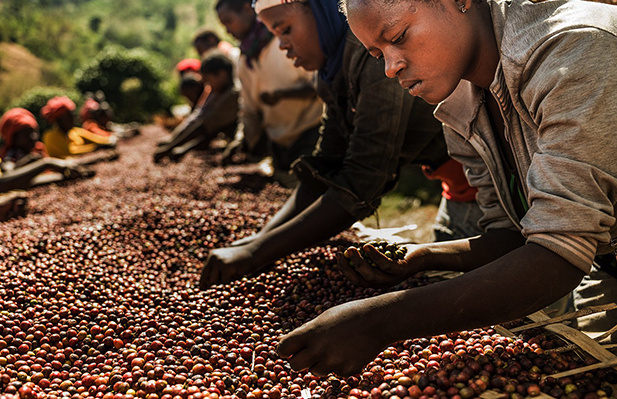Green transition: Climate change is coming for your coffee

Photo: Niels Van Iperen
The aim of this new research initiative is to assess how climate change and the current experimentation of adaptation and mitigation innovations will affect Ethiopia and Tanzania’s coffee value chains and reshape them into the future.
“Coffee companies and growers are astutely aware of the need to plan and adapt to climate change. Climate-smart coffee is an approach to reshaping the agricultural practices of the coffee sector based on the realities of climate change,” says Kristjan Jespersen, Project Leader and Associate Professor at the Department of Management, Society and Communication at CBS.
With 25 million small producers relying on coffee for a living and plantations sensitive to temperature changes and extreme weather conditions, there is a real threat the potential reduction of yields, land use shrinkage and more frequent and widespread pest and disease outbreaks will affect their livelihoods.
Even though farmers, government agencies, coffee roasters and traders, and development-focused NGOs along the coffee value-chain are experimenting with adaptation and mitigation innovations, including new cultivars, climate-smart farming techniques and new land-use strategies, the research project wants to address the real risk that this could produce paradoxical results.
Paradoxical outcomes
“Today regardless of their cultivar, impoverished coffee growers have a limited capacity to adapt to climate-related challenges so these impacts could further entrench them in poverty cycles. While downstream in the value chain, coffee buyers are worrying declining production volumes in high-value Arabica cultivation areas will threaten their present investments,” adds Kristjan Jespersen.
While Ethiopia’s coffee infrastructure is more sophisticated than Tanzania’s, the comparison and collaboration between the two exhibit empirically important contrasts. Currently, Ethiopian coffee commands high export market prices, while Tanzanian less so.
Today Ethiopia produces only Arabica, while Tanzania produces both Arabica and Robusta, positioning them differently in global value chains. While most global production is Arabica, which commands higher prices, the demand for Robusta is growing more quickly and is less susceptible to climate change.
These differences may result in divergent adaptation trajectories for both countries. Possible future options for Ethiopian smallholders could be climate-smart agriculture with climate-robust Arabica varietals, while land abandonment, crop switching, or a shift to Robusta may be more likely in Tanzania, particularly if demand continues to grow in Asian markets.
To date, little empirical work has been done that would help stakeholders anticipate and address such paradoxical outcomes. “On the one hand, climate-smart agriculture could facilitate upgrading – helping some coffee farmers differentiate themselves and increase added value or better market access. On the other, adaptation and mitigation programmes could make smallholders even more dependent on lead firms for inputs, expertise and market connections,” adds Jespersen.
New Knowledge
This research project is of strategic importance for Danish development cooperation. Under its strategic objective of ‘Inclusive, Sustainable Growth and Development’, Denmark is committed to supporting smart, sustainable, and equitable agricultural development, which requires supportive value chain structures.
The study will make use of both empirical and theoretical advances and analyse sectoral changes and model possible future scenarios informed by archival, ethnographic, focus group, interview, survey, and geospatial data. With expertise in both country’s coffee value chains, data collection will take place in local villages as well as interviewing actors involved in Ethiopian and Tanzanian coffee value chains but operating outside these two countries.
To maximise the benefits there will be capacity building including training in necessary computer software for project partners and the integration of project participants into relevant international networks such as The Sustainable Trade Initiative and the African Union. Additionally, all three university partners will undertake to publish research in peer reviewed journals and present their findings at conferences.
The aim is to spread this new knowledge to both academic and non-academic communities, while at the same time influence practitioners and policy makers to take identified factors into account to address the risks to producers appropriately while helping to create new opportunities.
“In a small way, we hope to enhance transparency of the coffee market in Ethiopia and Tanzania and inform economic decisions with accurate and timely data. If successful, we hope that our findings can further support the important work aimed at improving the productivity and resilience of this important and much-loved crop,” concludes Associate Professor Jespersen.



